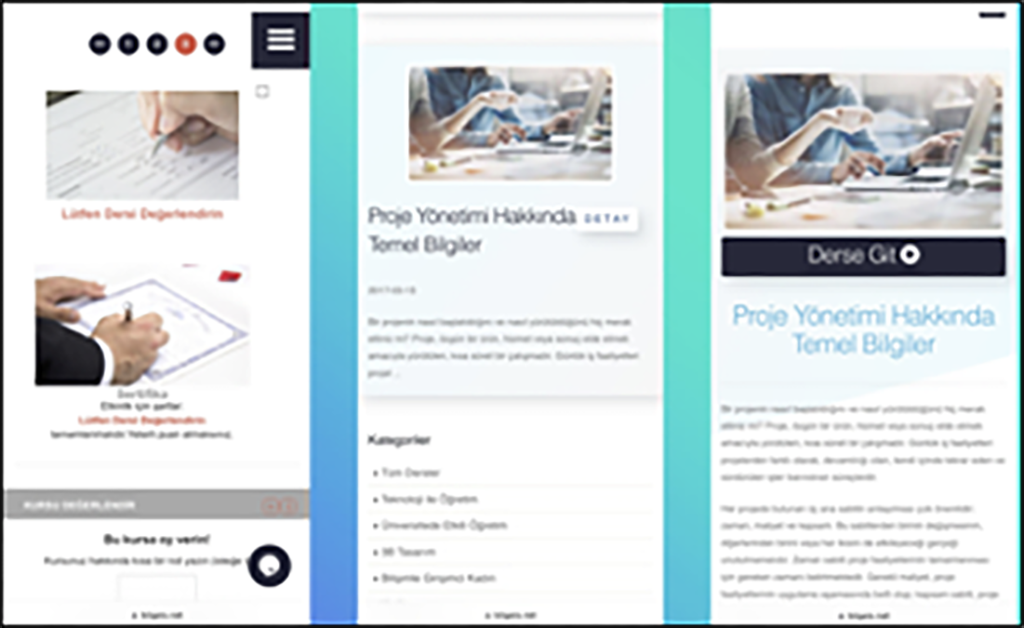
Online Trainings
The "flipped classrooms" method was used for the training of 100 BILSEM teachers to be selected. This method is a type of blended learning that reverses the traditional learning environment by delivering instructional content outside the classroom, often online. Traditionally, theoretical knowledge is presented to students in the classroom and students are expected to practice at home. However, in this method, the student learns theoretical knowledge before the lesson, and activities such as homework given in the traditional method are done in the classroom (Wikipedia, 2018). The purpose of online education is to provide participants with information about the theoretical content of the subjects before face-to-face education. Thus, when they switch to face-to-face education, they will not spend time on conceptual learning and will have basic knowledge about the subjects (see 3.3.). In this way, participants, instructors and lecturers will involve themselves more in the implementation (applied learning) phases.
Selection of participants
Academicians prepared a Google Form in the form of a survey to select prospective participants who were most likely to benefit from this training. First of all, it was considered to select teachers from the 3 provinces within the scope of the project. However, since the desired number of applications could not be reached, different provinces were also included in the selection. The target of approximately 200 applications/candidates was reached. In order to select, better know and evaluate teachers, their education level, English knowledge, previous projects, branch, purpose of participating in this training, etc. Questions about it have been prepared. It was decided not to select teachers with administrative duties as participants. Because the participants were asked to be able to apply it in their classes after receiving the training. In addition, gender equality and branch distribution were taken into consideration when making the elections.


Online training preparation meetings
Before the online training, a meeting was held via Zoom. At this meeting, digital platforms to be used for online training to be given to 150 teachers selected together with substitutes were introduced. What needs to be done to participate in face-to-face education was explained.
Design thinking course
Introduction to Design Thinking course from BİLGEIS.net online platform, an IPA I project of METU, was used. This platform provides a wide range of online training for business areas. The aim of BİLGEİS.net platform is to train employees on the job. This course was used as the first phase of our online training. The course has five assessment sections, including multiple choice exams and paper-based assignments. Individuals who were successful at the end of the course (at least 70 points) were given a certificate from METU. The recommended time to complete the course is defined as 10 hours. Obtaining a certificate of achievement from the course has been determined as one of the conditions for participating in face-to-face education.


Project management course
This training was provided through a course called "Fundamentals of Project Management", also on the BILGEIS.net website. At the end of the course, trainees gained knowledge about project development in terms of time management, financial management, scope management and quality management. The course has five assessment sections, including multiple choice exams and paper-based assignments. Individuals who were successful at the end of the course (at least 70 points) were given a certificate from METU. The recommended time to complete the course is defined as 10 hours. Another condition for participating in face-to-face training is to receive a certificate from this course.
Society 5.0 course
Participating teachers, who successfully completed two courses from BİLGEIS.net, attended the Society 5.0 course. They gained an understanding of the Society 5.0 philosophy and its sub-segments such as global warming, gender equality, poverty, equal opportunities in education. Facilitators and academics designed this course and evaluated participants' progress through a final comprehensive task during face-to-face training (development project). The recommended time to complete the course is defined as 10 hours. The course was published on Google Classroom, one of the learning management system platforms.


